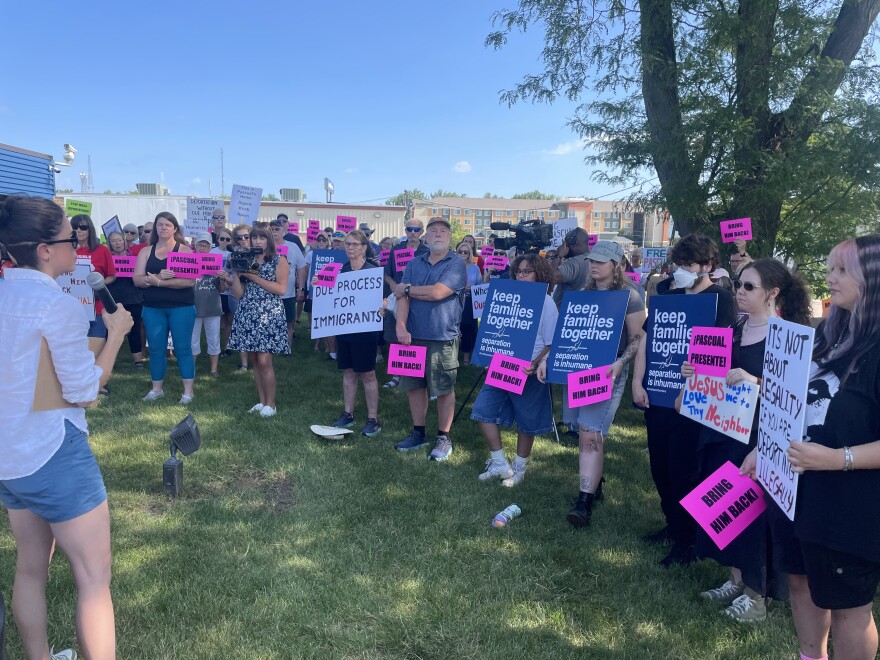During what would normally have been a routine check-in July 1, Immigration and Customs Enforcement (ICE) officials told Pascual Pedro they had an order to deport him.
Going into the meeting, the 20-year-old hadn’t considered that he might be detained.
“It was a normal day for me,” Pedro said. “I was just going to my check in with ICE and wasn’t thinking that something might happen that day.”
Pedro said he had never missed a meeting with ICE and hadn’t committed any crimes in the seven years he had been in the U.S.
In that time, he had built a good life for himself in West Liberty. His family said he was a star soccer player and good student. When he first arrived in eastern Iowa, Pedro said he was the only kid at his middle school who didn’t speak any English.
“Everyone was nice to me. Like, in the street, everyone would say hi or ask me how I’m doing,” he recalled. “In school too, everyone was nice to me — every teacher — and I’m just glad I got to know a lot of good [people] over there.”
Pedro said that’s why he was in shock when ICE officials told him they would be deporting him back to his home country of Guatemala as soon as he checked in.
“I was trying to ask them if I was going to be able to fight for my case or see a judge, or something like that,” Pedro said. “But they just kept ignoring me and ignoring me and they just told me there’s nothing to do about it.”
"I just want to be there. I’m still a young man. I haven’t done anything bad, and I just pray to God I can go back there.”Pascual Pedro
ICE officials communicated to Pedro where they were taking him. Over the July 4 weekend, Pedro said he was transported between detention centers in Iowa, Nebraska and Louisiana.
Then, at 2 a.m. on July 7, he said he was woken up and told to get on a plane. A little over seven hours later, he stepped foot into Guatemala for the first time in seven years.
By that point, it had been five days since he had any communication with his family, who didn’t know where he was.
“I just found a phone to let my family know [that I had been deported], because they didn’t know where I was, or what was going on with me after the last call I [made] at the Muscatine County jail,” Pedro said.
Now, he’s staying with his mother in Guatemala. Although he’s thankful to be with her, Pedro said he is questioning why he and others like him have been the subject of rapid deportations.
“I think about, ‘What did I do bad over there?’” he said. “Why do I deserve this thing that is happening to me? I’m just thinking about it, like, I’m not the only one in this situation.”
Pedro's deportation is one of many tens of thousands that have been carried out since President Donald Trump returned to office in January and began his mass deportation campaign, focusing on people in the U.S. with orders for expedited removal.
Expedited removal is a rapid deportation process that allows ICE to deport people without the approval of an immigration judge.
Pedro’s lawyer, Timothy Farmer, said that when Pedro came to the U.S., he had been given an order for expedited removal. But he’d been allowed to stay under a different order for supervision, which required him to report to annual check-ins with ICE.
“That’s basically a situation where ICE exercises their discretion,” Farmer said. “And even though there is a valid removal order out there, they decide not to execute the order and instead allow the person to remain in the United States.”
When Pedro showed up for his July check-in, Farmer said that’s when ICE officials made it clear they intended to execute his removal order. But Pedro said there wasn’t any reason for him to be sent back to Guatemala, and now that he’s back, it’s not the same anymore.
“I’m actually not mad,” Pedro said. “I just feel sorry about what’s going on, because people like me that are actually doing the right thing, like, actually working for a better life, a better future — we're the ones that get affected [by] everything that’s going on.”
In the roughly four weeks since Pedro's return to Guatemala, protests against his deportation have sprouted across eastern Iowa. Most recently, hundreds gathered outside a federal courthouse in Cedar Rapids, demanding Iowa’s Congressional delegation to bring Pedro back to the U.S.

Other demonstrations have drawn hundreds to the ICE office in Cedar Rapids, where Pedro was detained and to the congressional offices of Iowa Sens. Joni Ernst and Chuck Grassley, and 1st District Rep. Mariannette Miller-Meeks in Davenport.
“I feel grateful that there’s people that actually believe in what’s right,” Pedro said of the outpouring of support from the community.
Now, he hopes to someday return to the U.S.
“I would love to go back, if everyone over there thinks that I deserve a chance,” Pedro said. “I can still go to my check-ins if they give me a chance, like, I just want to be there. I’m still a young man. I haven’t done anything bad, and I just pray to God I can go back there.”





